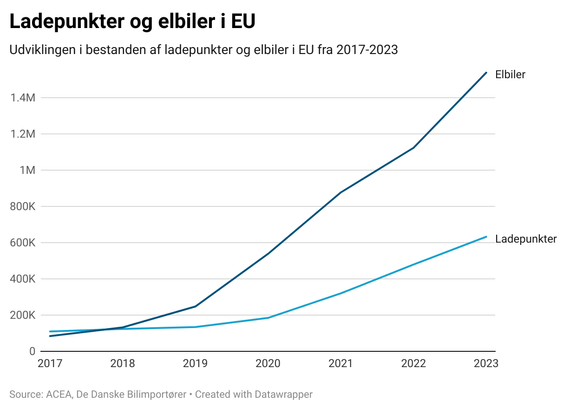In order to reach the CO2 targets for 2030, the EU must set a significantly higher pace in the installation of charging points. A new report reveals that an increase of 19,000 new charging points per week is necessary to meet the targets.
New data from the European car industry reveals that between 2017 and 2023 the number of electric cars in the EU grew three times faster than the number of new charging points. This has led to an increase in the number of electric cars per charging point, which makes charging less accessible to motorists.
Allan Skytte Christensen, Chief Consultant at De Danske Bilimportorer, expresses concern about this development and says that it requires a significant improvement of the charging infrastructure, not only in individual countries, but across the entire EU. He points out that the speed of setting up charging stations must be increased considerably.
The latest report shows that 150,000 charging points were created in 2023 across the EU. In order to achieve the CO2 targets towards 2030, this figure must increase to 1.2 million per year, which corresponds to 22,000 per week. This growth is crucial to achieving the climate goals that have been set and requires priority action, as the current number is 19,000 below the required weekly level.
READ ALSO: Chinese diesel engine has set a wild record!
Allan Skytte Christensen points out that quick political action is necessary to achieve the climate goals. The AFIR regulation sets out guidelines for the member states, but this is insufficient.
He believes that all municipalities should commit to ambitious goals for the spread of charging infrastructure, and that charging rights should be established for residents in apartment buildings without a private charging station.
By creating more charging points, the transition to electric transport will not be hindered by a lack of charging options.


